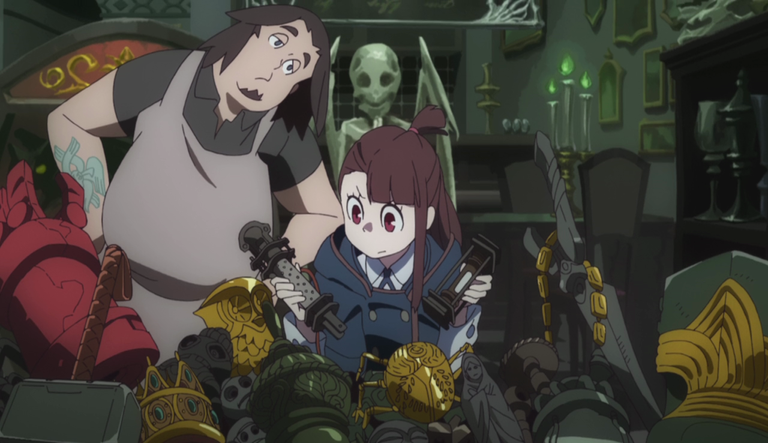
Studio Trigger's best work is the short film Little Witch Academia, directed by You Yoshinari. The film only runs for 30 minutes but it packs in adventure, a magical sense of wonder, action and some character drama. The score is well composed and very appropriate for a short and magical experience. It had a strong appeal to those who remember their childhood days of wonder and excitement, and it brings those to life. The budget was well managed and the project was very successful. Trigger was able to build enough hype around Little Witch Academia that they crowdfunded another movie. The idea behind Little Witch Academia, that a hopelessly stupid girl gets into a magic academy and is roped up in shenanigans and some form of greater plot, is a well presented one and it's not a surprise that the fans wanted more of it.

Unfortunately, what started out as a good idea turned into an obligation. Once the crowdfunding campaign had ended Trigger had to make a movie. The sequel, Little Witch Academia: The Enchanted Parade, did not have the same sense of wonder and intrigue as the first movie. Most importantly, it used magic as a gimmick rather than as a fundamental element of the world. The first movie showed us a world with magic, but the second just showed us a world that had characters who could do magic things. Most disappointingly, the second movie is significantly smaller in scope than the first, revolving around an annual witch parade that seems important, but only the detention kids work on it. The premise shows a lack of respect for the original idea. While the movie revolved around the main character, Akko, ruining things and getting into bad situations before resolving them in miraculous fashion, it was lackluster compared to the achievement of the first.

Several years later, Studio Trigger decided they would make a TV show for Little Witch Academia as a re-imagining of the initial good idea. The first half of the show is mostly episodic fluff which is sometimes vaguely interesting, but is very hit or miss. There were one or two good episodes in there and most episodes had stupid premises or stupid resolutions. The first half can only truly be appreciated by children. It was not an outstanding first half. The second half developed the main plot that only received hints and unclear directions in the first half. It also introduced the main antagonist and started to derail itself from there. The antagonist used a magic-based science and gained a position in the school where she would do absolutely nothing for 10 episodes before almost starting a war, endangering the life of Akko and her mentor, and being a generally despicable person. The show handles its antagonist very poorly, which happens to be a recurring element of the show.
Most characters are handled poorly. Akko's friends are all irrelevant save one, plus a non-magic human is introduced as a potential grounding character to challenge Akko's views but possibly reform some organisations for the better. Unfortunately, the grounding character, Andrew, becomes useless and does nothing until the very last episode, and even then he is hardly relevant. Akko's rival from the original movie has a much larger part in the show, but at the cost of her character from the movie and the cost of the screentime that could have been for other characters. Akko's mentor has a considerable amount of screentime and, like most others, does nothing until the end.

It's a great shame that such a strong idea became wasted and ended up being tarnished by an underwhelming movie and an even more underwhelming show. If it counts for anything, the show does include Chumlee from Pawn Stars.
To be honest it didn't seem like an idea that could work in the long run unless they escalated things to evermore higher proportions to the point where the school setting is ridiculous.
The stakes were high enough in the first movie that there wasn't much higher up they could go. The show tried to start at low stakes and escalate, but it stayed at low stakes for far too long.
So you think that the problem was with the execution and not with the premise itself?
Yes. It’s a bit harder to have a premise so faulty that it can’t work. The movie showed that they could make the idea work with focus.
@originalworks
The @OriginalWorks bot has determined this post by @medicinemerchant to be original material and upvoted it!
To call @OriginalWorks, simply reply to any post with @originalworks or !originalworks in your message!